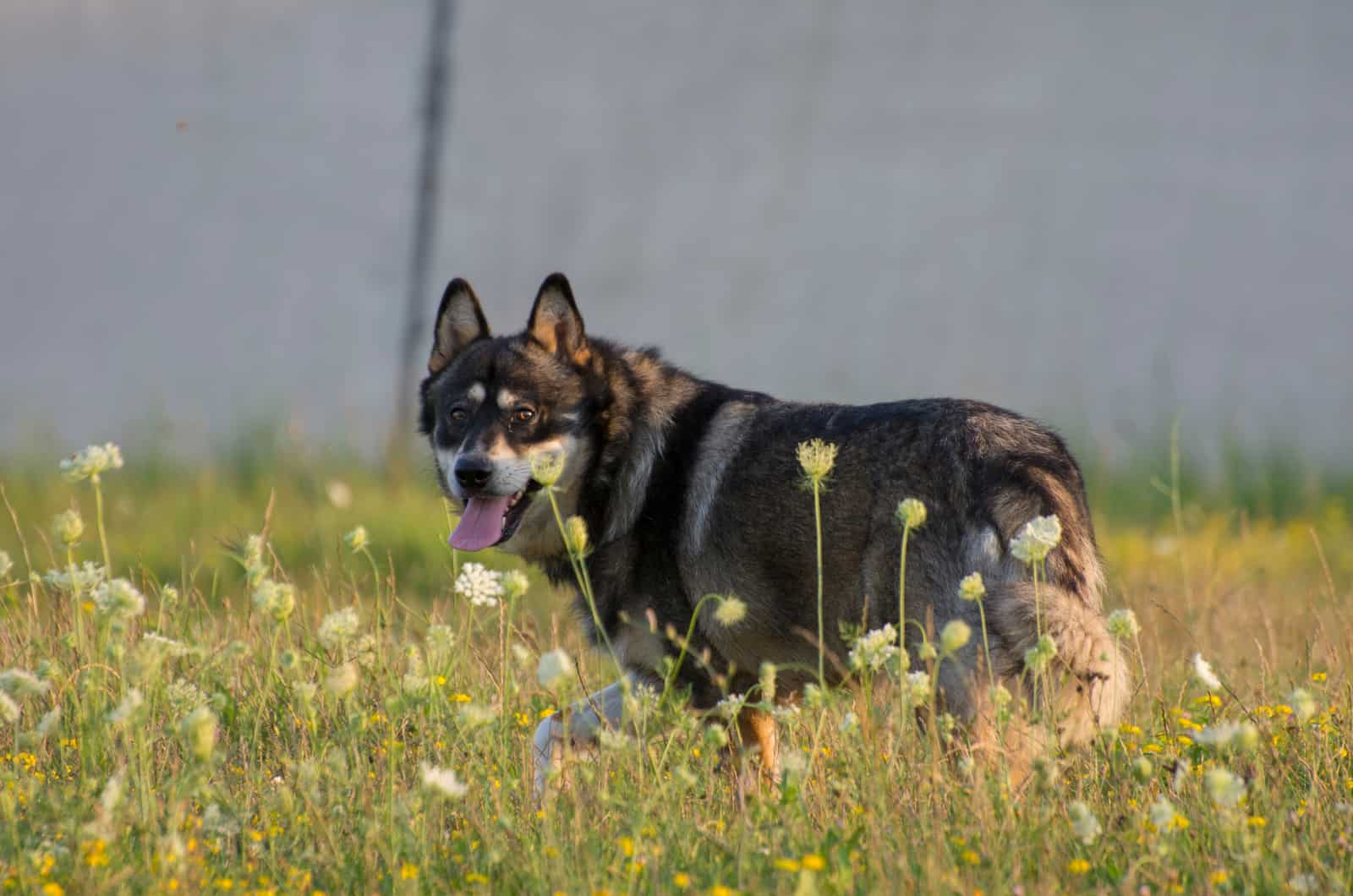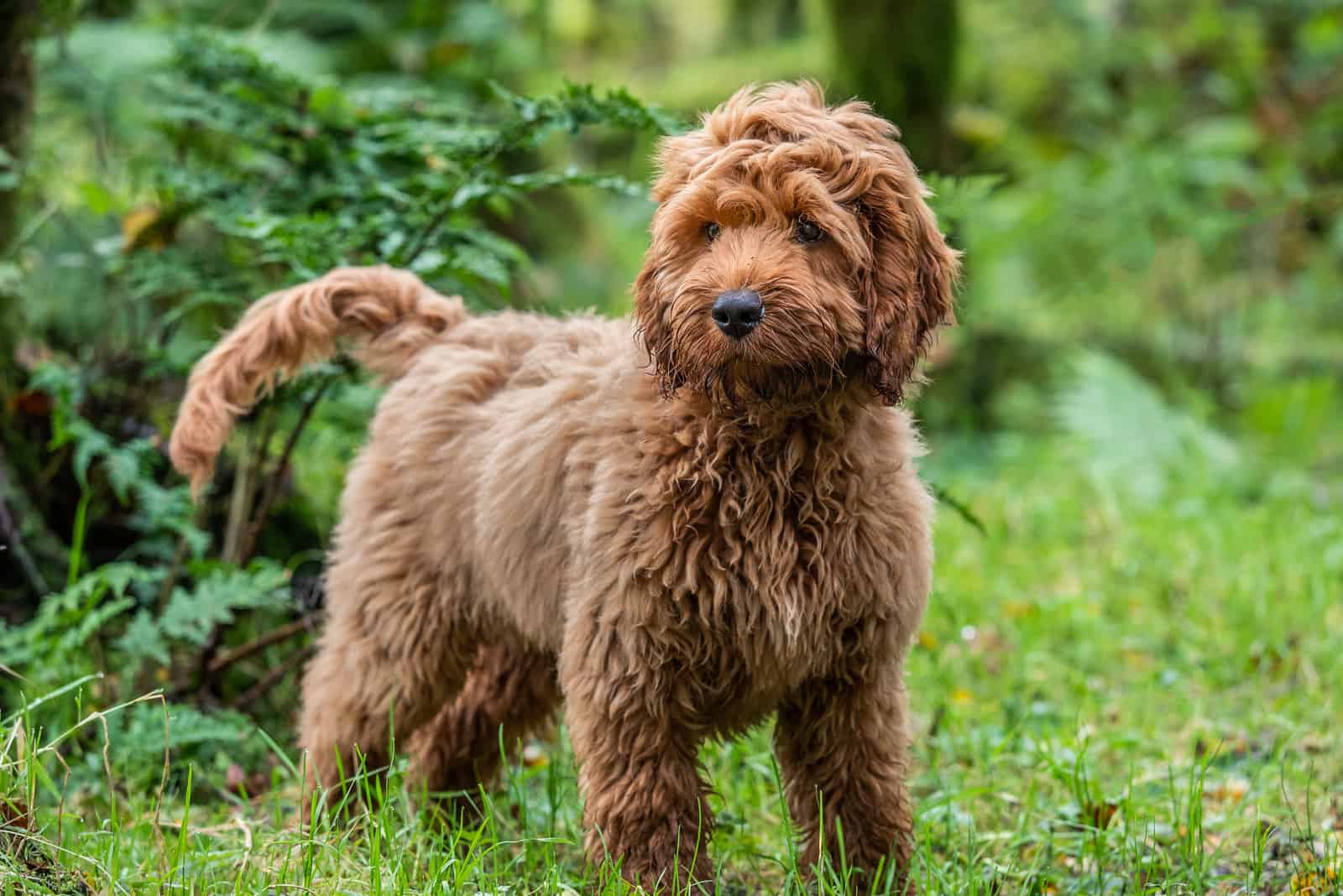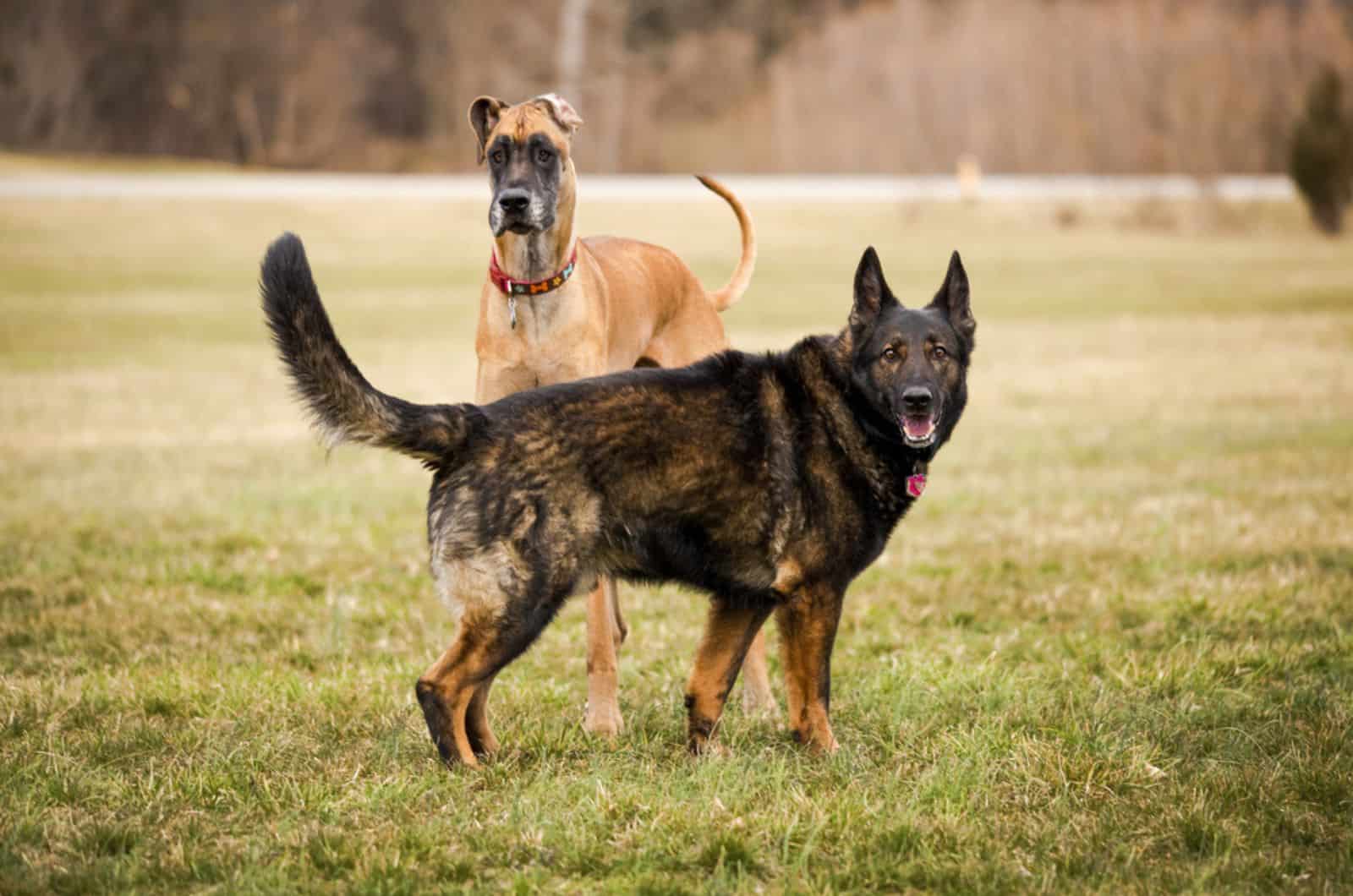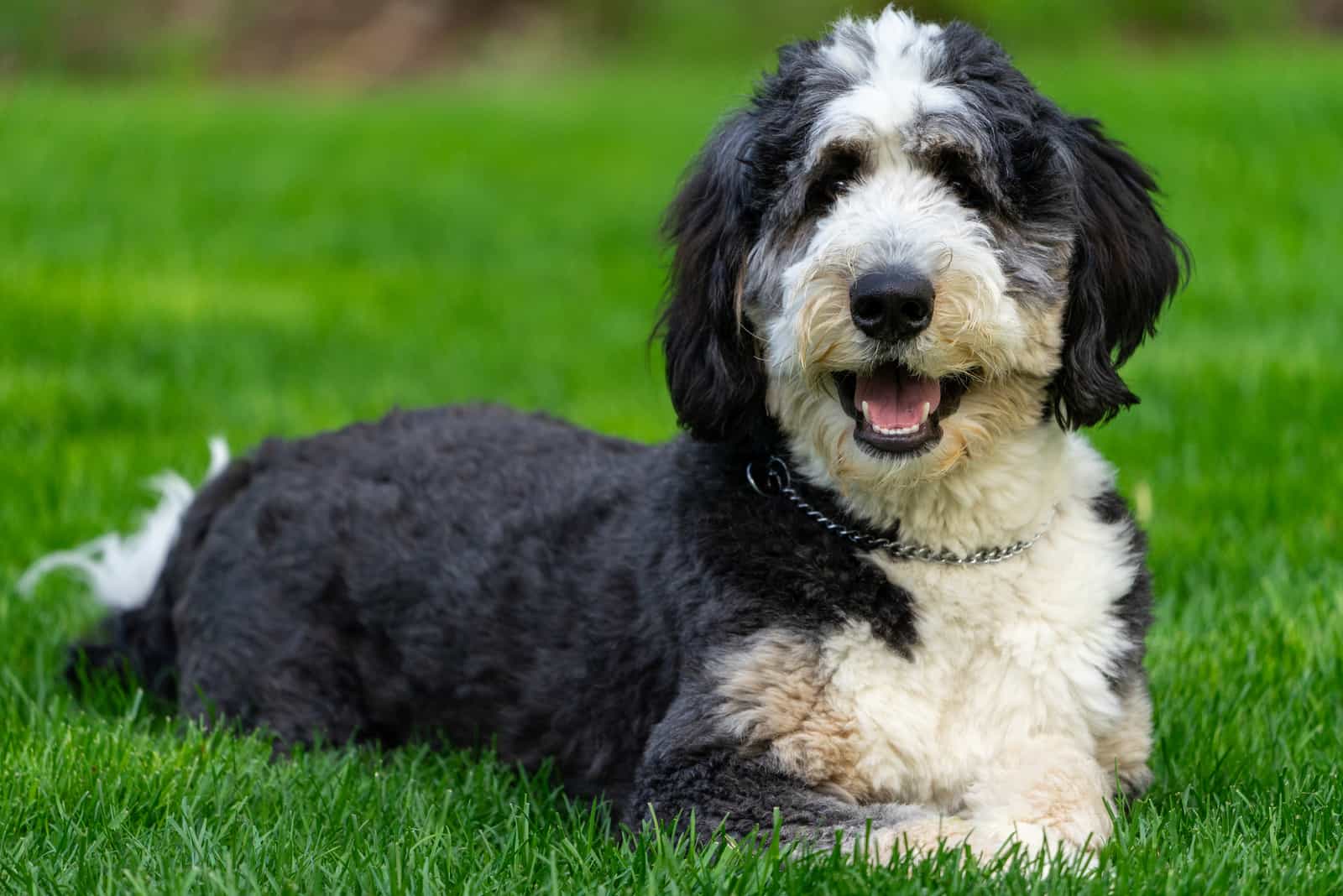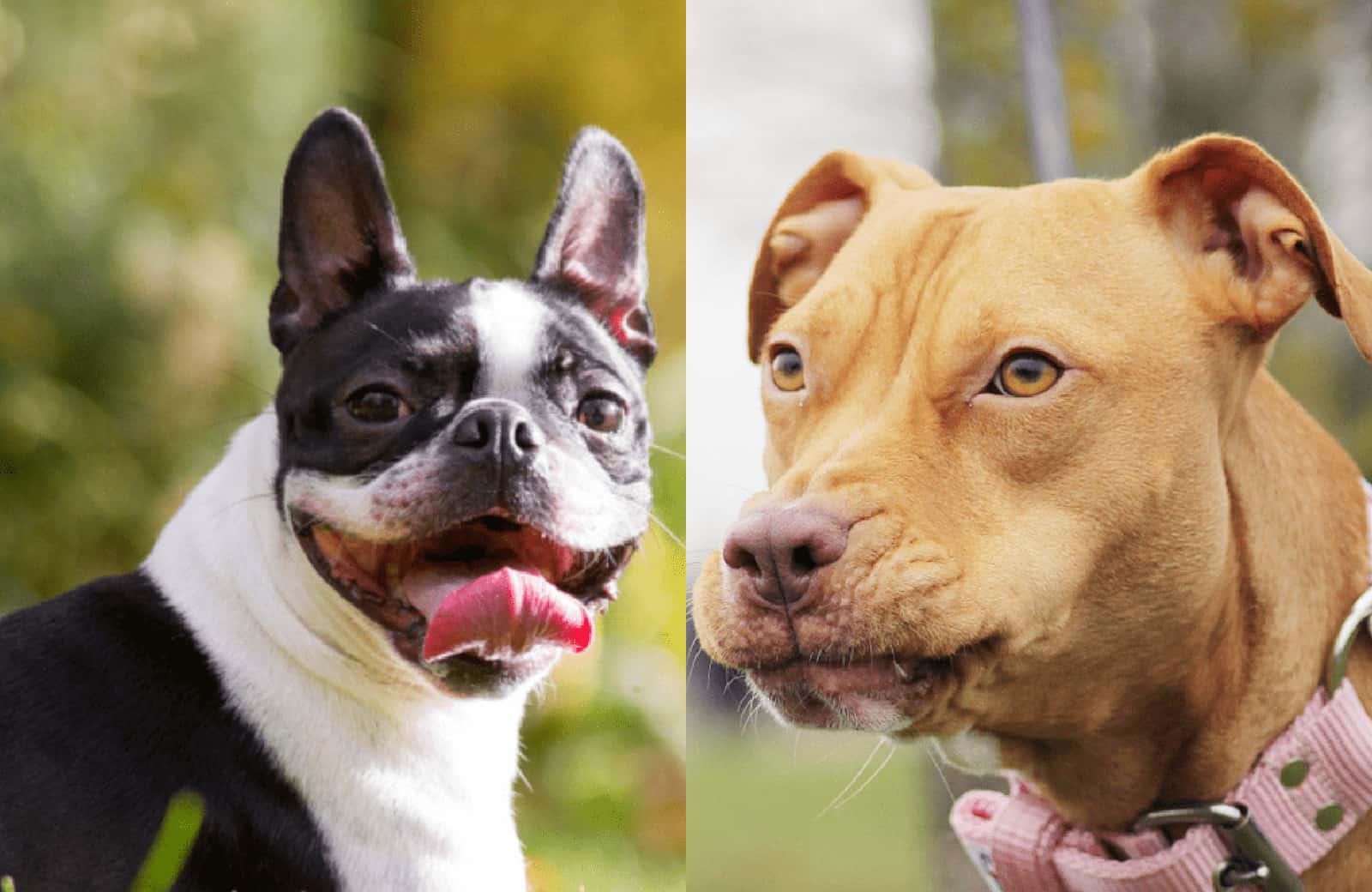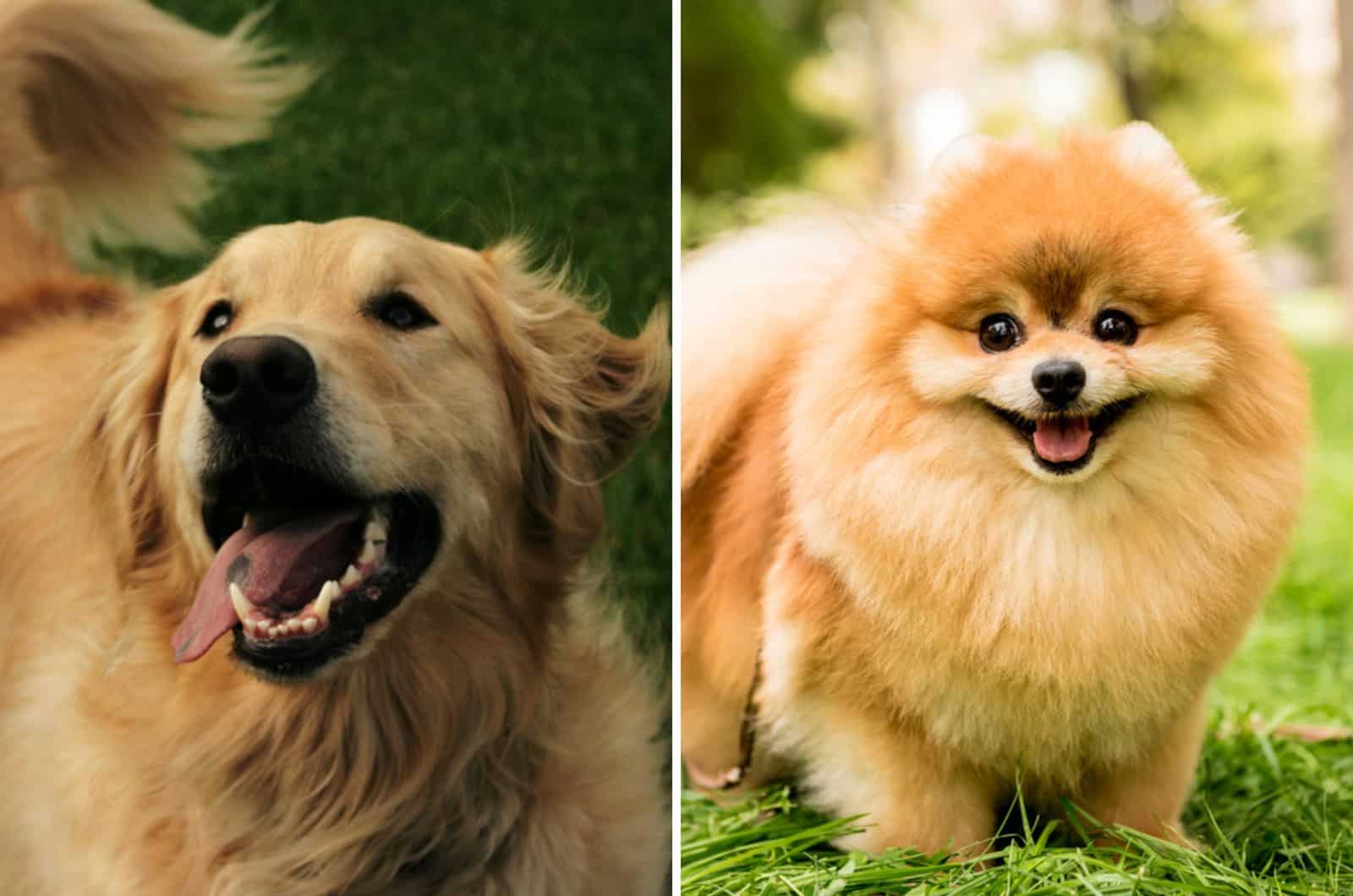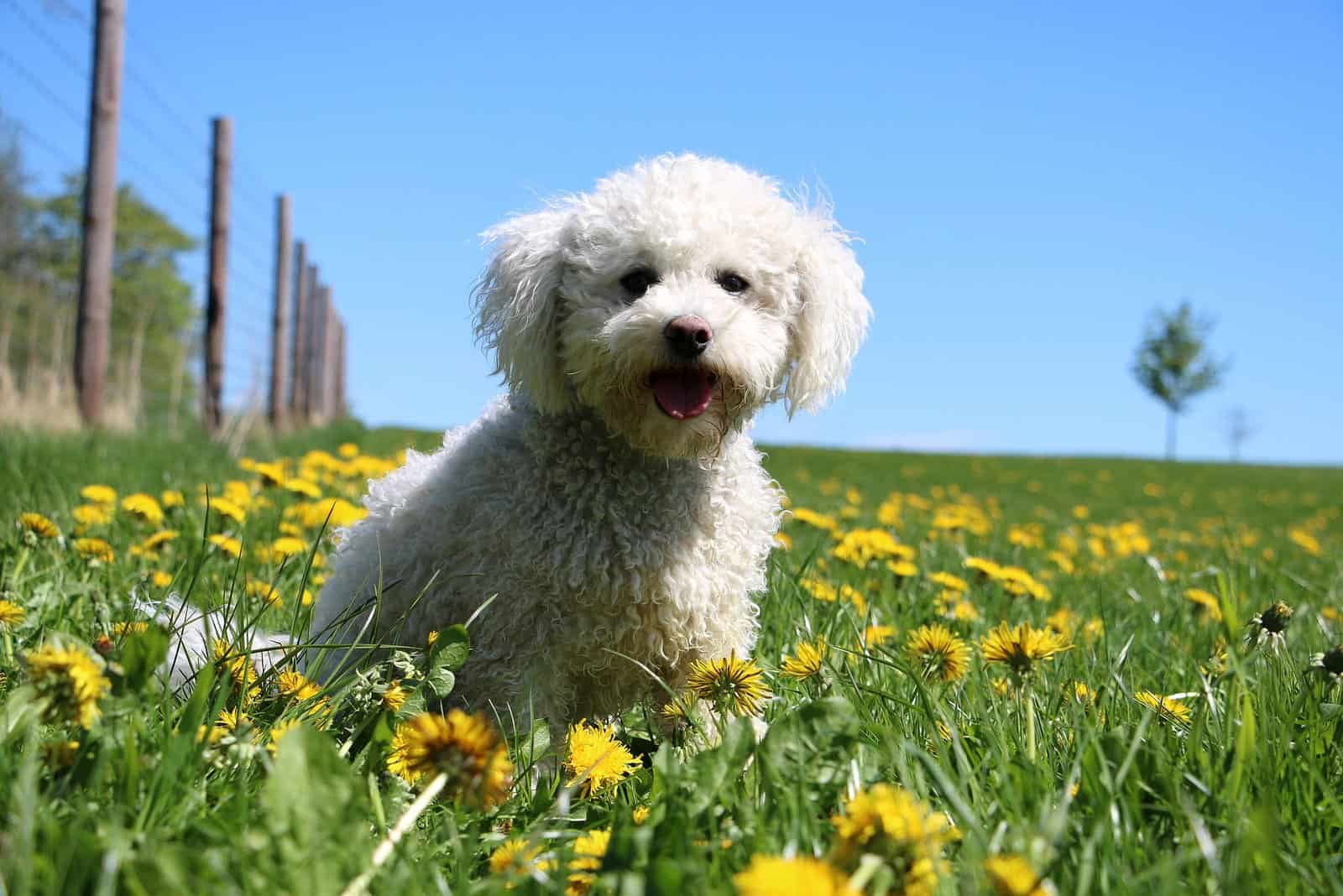When it comes to fluffy family oriented pups, the Bernedoodle and the Sheepadoodle are one of the best candidates for the job, but in the Bernedoodle Vs Sheepadoodle debate, which one is better?
Well, when looking at the Bernedoodle vs Sheepadoodle contest at a glance, one would realize that the two dog breeds have a lot in common.
They’re both loving, hard working dogs that are intelligent and relatively easy to train.
They understand complex tasks and some even serve as emotional support animals thanks to their high levels of empathy.
And they’re both adorable in their own way too, not to mention extremely active and playful.
That’s why, if you’re stuck deciding between which of these two lovely breeds to get, you may be there a while, trying to find the smallest detail that sets one apart from the other.
But, there’s no need for that as I’m here to help make that decision a little easier.
Sure, the two may seem similar on the surface, but each of them have their own distinct niches they excel at which may prove to be the deciding factor in which of these two breeds comes out on top.
And no, their heritage and appearance aren’t the only difference, but can play an important, subjective role in your decision making process, a detail equally as important as any other.
So, read on to find out a little bit of history about these two mixed dog breeds, what unique characteristics they possess as well as a comparison of their similar traits and some frequently asked questions regarding them.
Bernedoodle Vs Sheepadoodle: The Rundown
Before we can get to comparing the two breeds, let’s get to know both of them a little bit better to see what makes each of them so unique and special.
The Bernedoodle
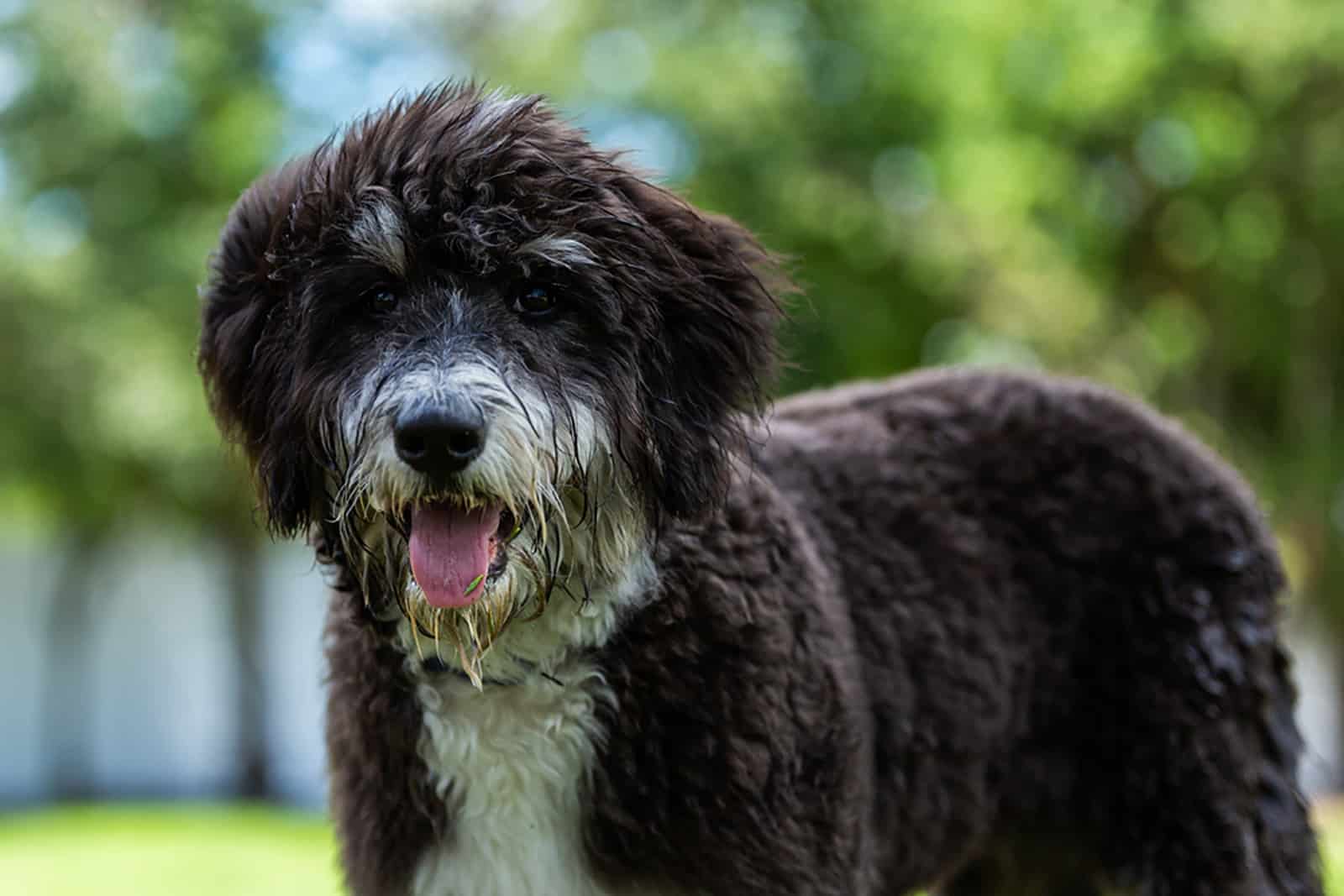
The Bernedoodle is something that’s considered to be a designer dog, a mix between two great breeds, the Bernese Mountain Dog and the Poodle.
While the breed may have existed in the past through sheer happenstance, the first proper breeder of this lovely breed is a Canadian named Sherry Rupke from Swissridge Kennels.
This means that they’re a relatively new breed, and, given how they’re not purebred, they’re not recognized by the AKC (American Kennel Club), which is a shame, but it’s not really that big of a deal.
The actual active breeding of the standard Bernedoodle started up around the year 2003.
It was done in order to make the perfect canine companion tailor made to be the ideal family pet rather than a show dog or similar.
And, in my honest opinion, I believe they’ve certainly made a good effort.
Better Immunity
The mixed breed is more resilient than its parent breeds as it took on the best traits of both sides meaning you’ll need to worry less about visits to the vet.
Hypoallergenic
They don’t shed all that much and are considered a hypoallergenic breed, so allergy prone family members don’t end up in danger over your desire to get a family pet.
Plus, nobody’s going to have to clean dog hair off the couch or the blankets.
Maybe a stray hair here and there but that’s about it.
Highly Intelligent, Emotionally And Mentally
These dogs are particularly great at reading the room, so to speak, and acting accordingly.
They’re easy to train and can provide excellent emotional support.
Training usually doesn’t take very long, though they can get a little bit stubborn in their youth, but that’s only natural with every dog given the playful nature of a puppy.
This fades with time, though the process will get accelerated the more time you spend with your canine companion as proper socialization is key to good behavior and a solid upbringing.
The Bernedoodle is made to be a gentle dog that’s great around kids and can bounce off their energy as well as they can off of his.
If you’ve socialized him properly, he’ll be patient around them and take things at the children’s pace rather than his own.
Not to mention that they’re extremely good cuddlers and enjoy getting nice and cozy up to someone as much as they do being outside and playing around with others.
Energetic
As your kids grow, he’ll easily be able to keep up with them given his above average energy levels and the willingness to hang around others.
These traits alone will make him the MVP of your family home, at least among your kids if not anyone else.
Good Around Other Dogs Too
These traits of better understanding and higher emotional intelligence also make him a great playmate for other dogs too as it’ll rarely ever escalate into anything too violent or overly aggressive.
A Unique Appearance
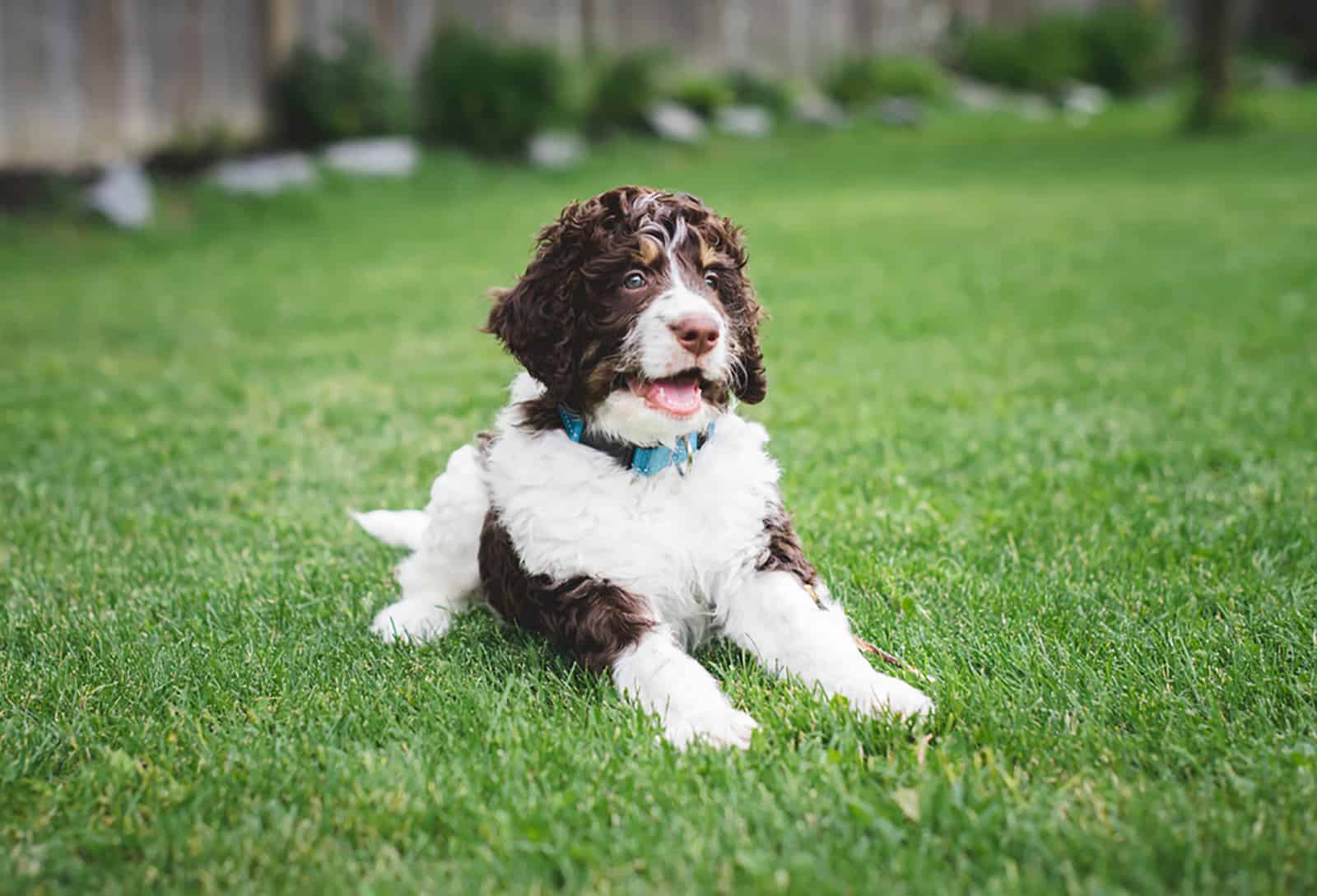
Given their mixed breed status, Bernedoodle dogs have a vast array of different potential looks and appearances depending on how the genes of the parent breeds ended up mixing and their own fur color.
You can get all sorts of interesting colors and patterns mixed in and you never really know until a puppy’s fur comes in, but I can guarantee you that each of them looks as fantastic as the next.
One of the most popular options in regards to aesthetics is the tri-color mini Bernedoodle.
Their hair is curly and quite soft, making for ideal cuddle partners.
A Loving Package In 3 Different Sizes
Depending on your tastes, you can get a Bernedoodle in 3 different size options too, each depending on the dog’s poodle parent.
You have the standard size, the mini Bernedoodle size and the tiny sized dog option with the poodle parent being standard, mini or toy sized respectively.
And trust me when I say that his size won’t affect his health or his energy levels. He’ll be as eager and loving regardless of which one you choose.
Height And Weight
With the sizes mentioned, I figured it’s worth throwing some of the more boring statistics in too.
Bernedoodles have a varying max height for adults of their breed that can go anywhere from 12 to 29 inches, give or take a few depending on edge cases.
It may seem like a big gap, and that’s because it is. The range is a fusion of 3 different ranges that vary based on parentage.
The same can be said for their total weight that can go from 10 to 90 pounds, give or take a few based on diets and overall metabolic health.
Lifespan
Given how they’re not all too prone to diseases as some purebred dogs might be, the Bernedoodle can live anywhere from 12 to 18 years of age, a staggeringly positive result given how most dogs’ average is a bit less than 15.
Though, this means that you hopefully won’t need to take him to the vet too often to rack up your medical expenses, even if it’s for your furry best friend.
The Cost
Despite not being a purebred, Bernedoodle pups’ prices can vary greatly depending on the quality of the pet parents in question and the hereditary traits that he or she gets.
The pups move from about 2000 dollars on average to higher in some countries.
That said, mixed breeds can sometimes be found at local shelters, so you may end up being in luck and finding one there to take care of and love.
You’ll save yourself some money and you’ll be saving at least one life then.
That said, no dog is ever just sunshine and rainbows, they’re big responsibilities too.
A Need For Affection And Companionship
The Bernedoodle is one such dog, a glutton for attention and companionship.
After all, there’s a reason he wants to be around others so often, and this needs to be reciprocated, otherwise he may end up feeling lonely.
Bernedoodles are best situated in homes where they’ll always have someone to be around with and people who can fulfill their needs for exercise and play.
Sure, chew toys and cuddle toys may abate that need temporarily, but if you feel like you can’t provide that level of presence for your furry friend here, then it may be best to look for a different breed.
A Sensitive Soul
While the Bernedoodle does make for a great family and guard dog, he’s also easily startled and may end up barking at even the slightest of odd sounds.
The Sheepadoodle
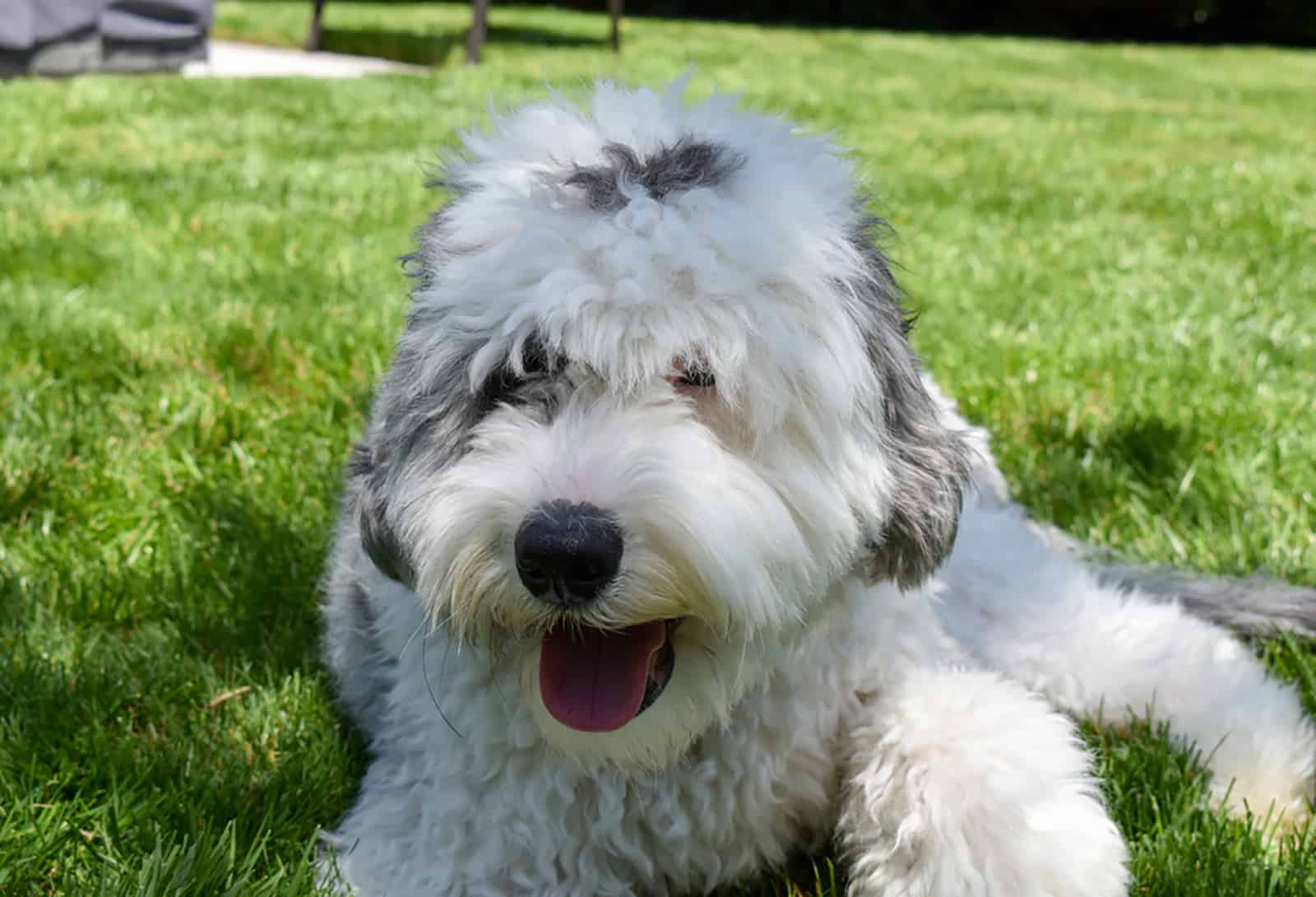
As for the Sheepadoodle, he’s the result of a crossbreed between a Poodle and an Old English Sheepdog.
Equally as adorable as the Bernedoodle and a lot more caring and attentive to family members, this dog is yet another successful mixed breed experiment.
The idea behind the “Sheep-a-Poo” or the “Sheepdoodle” was similar to that of the Bernedoodle, albeit done a bit earlier, somewhere around the 1980s, people wanted to breed the ultimate comfort dog that could still be the home’s protector.
What they got was this lovely fluffball.
Sure, it’s not recognized by the American Kennel Club due to its status as a mixed breed, but these doggos’ main purpose wasn’t to be show dogs in the first place anyway.
A Natural Empath
The Sheepadoodle has an even greater level of emotional intelligence than the Bernedoodle, which is why they’re chosen as emotional support dogs so often for people in need of therapy or trauma recovery.
Mind you the difference isn’t great, but it’s enough to notice that there is a difference.
Low Maintenance
The Sheepadoodle is a relatively low maintenance dog too. They’re a low-shedding breed which makes them ideal for the household, nor do they require much exercise even though they’re a high energy dog breed.
People prone to allergies needn’t worry around them as they are hypoallergenic, though, they’ll still need to get brushed every now and then to keep up with grooming practices.
About 2 to 3 times per week and standard grooming maintenance every 2 months or so.
All you really need to give them is your love and attention aside from the standard needs like food, water and shelter and some regular play and exercise.
Trainability
Given their high intelligence levels, the Sheepadoodle is also relatively easy to train.
That said, this is a common trait between a lot of doodle dog mixes like the Aussiedoodle, Labradoodle or the Goldendoodle as the standard poodle is highly intelligent on average.
Height And Weight
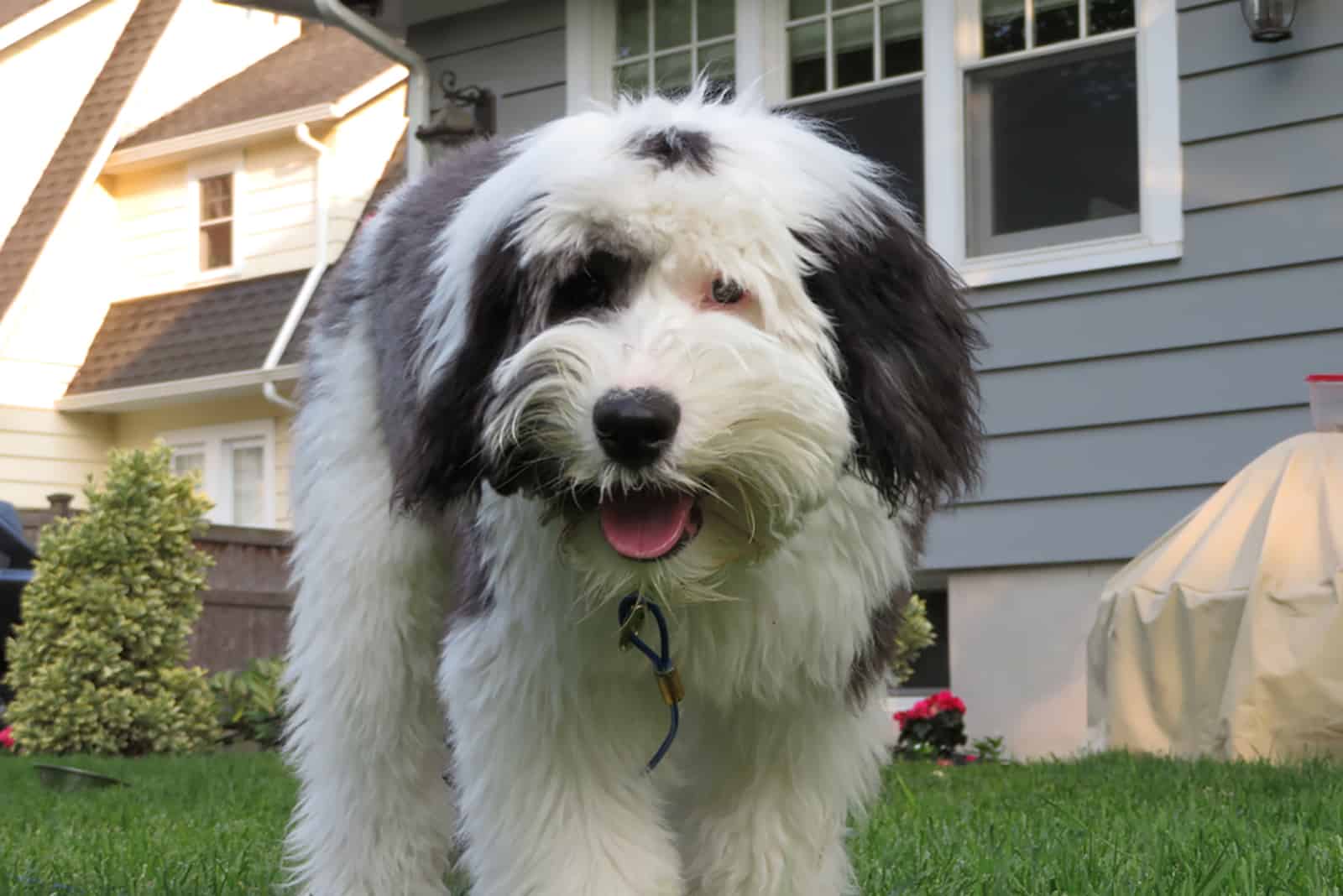
This dog breed has an even bigger height variation than the Bernedoodle, coming in at anywhere between 13 inches all the way up to 36-38 inches in height, with the standard Sheepadoodle coming in between 20 to 27 inches in height.
As for their weight, the standard Sheepadoodle goes anywhere from 30 to 80 pounds of weight putting them in a slightly lower weight range compared to the Bernedoodle and somewhat fewer daily calories needed.
Color Patterns
Despite being a mixed dog breed, the Sheepadoodle doesn’t get the sheer scope of color and pattern variation as the
Bernedoodle does, but what it does get are some of the best colors for any doodle breed.
They come in some simple, but classic colors, be it gray, red, white, black or some mishmash of black and white areas, depending on what gene becomes the dominant one.
The two tone coat color is more prevalent than a singular color at any point, so don’t be surprised to see color mixes for their fur patterns more often than a single one.
Great With Kids
Above all else, family dogs love to play with others and the Sheepadoodle is no exception.
This is especially true for Sheepadoodle puppies who will jump at the chance to get some activity in and make new friends with children and dogs alike.
But don’t fret, they like playing with adults just as much, but they do prefer like-minded individuals who can keep up with their high levels of energy.
That said, it’s not all hustle and bustle with them as they have their kinder, more paced side to them too.
This is shown in their need to socialize with others and just sit down and cuddle next to any willing person that the dog trusts.
Tolerates Other Household Pets
The Sheepadoodle isn’t a combative sort either and he’ll get along with almost any other pet you may have in your household, even cats, as long as they get used to one another first.
All they want to do is be friends and live in a calm, chill environment.
Lifespan
The health of a Sheepadoodle is nothing too exceptional but it’s not as bad as that of some other breeds.
Sure, he can suffer from a number of health issues, but most of those pop up in the dog’s senior years anyway with the most common ones being bloat and joint issues, common in medium or large dog breeds.
They often live to be at least 12-13 years old with some dogs pushing up to 15. Of course, there are exceptions, but they’re rare.
If you’re getting yourself a mini Sheepadoodle however, you can expect them to live an extra year or two, usually ranging between 13 to 16 years since they don’t suffer from a few of the health problems that standard Sheepadoodles do.
The Average Cost Of A Sheepadoodle Puppy
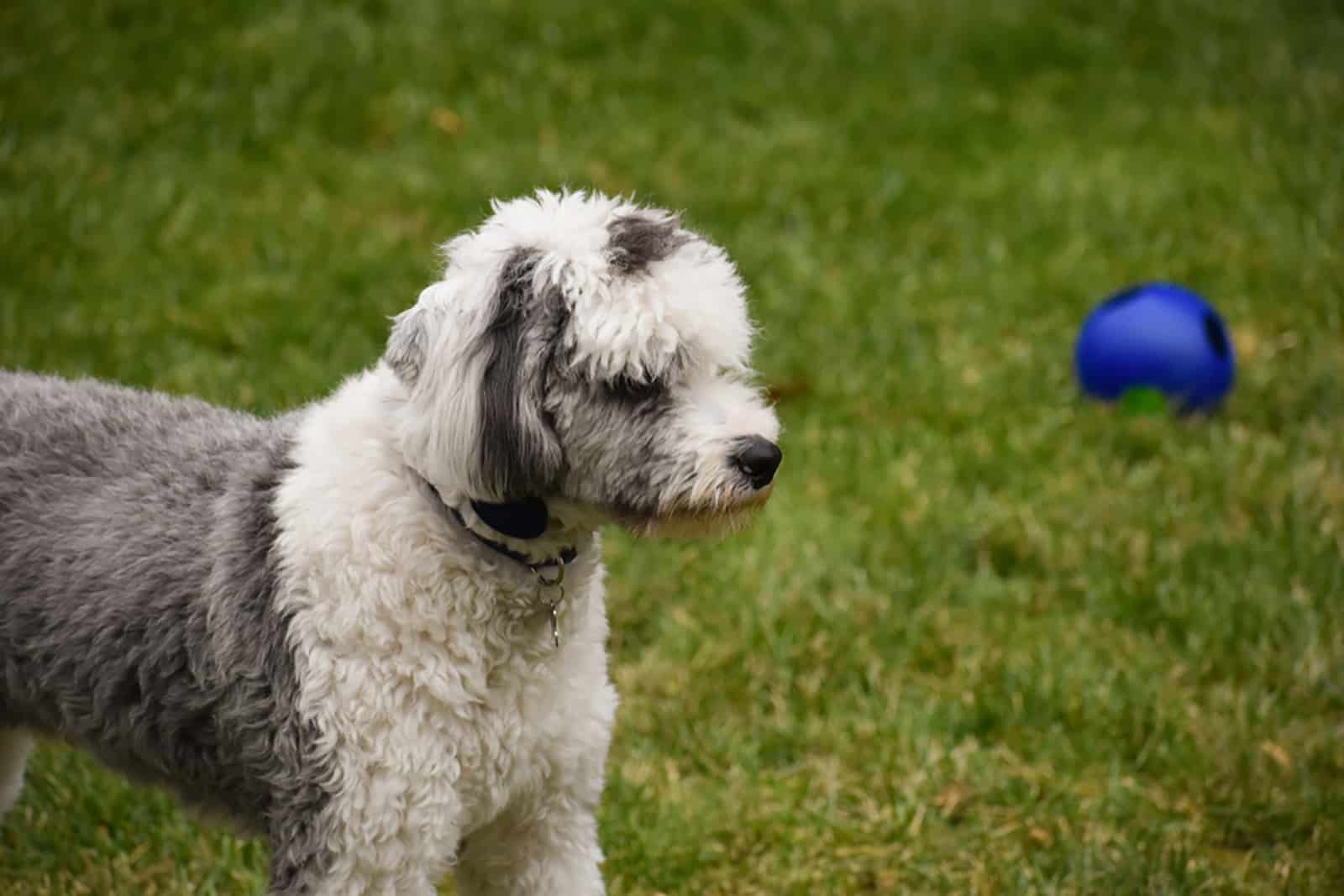
Sheepadoodle puppies cost a lot less than a Bernedoodle puppy does in comparison with the most affordable options coming in at around 1000 dollars.
That said, the Sheepadoodle can often be found in shelters too, so don’t forget to look at your local dog rescue just in case you run into one as then you may be able to get one at a fraction of the cost.
Whatever you do though, avoid buying from puppy mills as they’re most likely to not provide dogs with ethical and caring treatment.
Given their low-shedding nature, they also don’t usually need much in terms of grooming or other maintenance costs as they don’t have any special diets.
Of course, exceptions are possible with some potential food allergies or some rare diseases, but should otherwise be more than fine.
This goofy little guy does, however, suffer from the same issues that the other poodle mix breed, the Bernedoodle, does, needing to be around others.
While it’s a great and wonderful trait to have, it is a double-edged sword as you’ll need to give a lot of that attention back.
It can be somewhat draining at times, but it’s not as bad as it sounds if you can alternate between the dog with family members or others.
A Great Need For Affection
However, as was the case with the Bernedoodle, you shouldn’t leave him alone for long periods of time at any point.
This is likely to give him separation anxiety or some form of depression and may lead him to acting out more to get your attention in the wrong way.
He may develop some more destructive habits and you may end up coming home to some destroyed shoes, pillows or furniture, which isn’t going to be a good time for anyone.
If you can’t spare the time to always have someone around him, then you may need to hire a dog sitter, otherwise, you may want to consider a less clingy dog breed than this lovable little teddy bear.
Thankfully, there are plenty of affordable options out there that help you give the dog the attention he needs with doggy daycares, said dog sitters or dog walkers even.
Sure, it only adds to the existing maintenance costs of your canine companion, but it’s a small price to pay to keep him happy and in high spirits.
Natural Herding Instinct
Given how some of its genes do come from a herding dog, the Sheepadoodle has retained part of that natural herding instinct which can sometimes come out around kids who aren’t ‘staying in line’.
This can sometimes result in the odd nip here and there, but can easily be corrected through proper training.
Bernedoodle Vs Sheepadoodle: The Comparison

Now that you have a more detailed idea of what both breeds are like, it’s time to compare them to see where each of them excels and if we can properly determine a winner based on these comparisons.
Mental Intelligence: The Bernedoodle Wins
While not an easy thing to measure for dogs given their inability to speak, Bernedoodles have shown to solve problems and understand tasks quicker than the Sheepadoodle.
Mind you the difference is very slim, but it exists and this point goes to the cuddly Bernese Mountain Dog and Poodle mix
Emotional Intelligence: The Sheepadoodle Wins
A reverse situation in this case. While both dog breeds have high emotional intelligence and are seen performing similar roles in society, the Sheepadoodle ultimately inches out as the winner.
This is due to them being a lot more laid back and calm even around the most tense situations or loud noises whereas the
Bernedoodle is a bit more skittish which can cause it to act out on occasion.
Sure, the Sheepadoodle has that natural herding instinct, but that rarely comes into play and is usually resolved early on in his life.
Overall Health: The Bernedoodle Wins
While the lifespan of either of these dog breeds depends greatly on the chosen size, the Bernedoodle ends up having a higher ceiling in optimal conditions.
Mind you, they both still enjoy relatively long lives on average, but the fact that Bernedoodles are more resilient to illness and disease than their Sheepadoodle counterpart and are less prone to specific health issues puts them a bit above the other.
The larger examples of both breeds do both suffer from common health issues that affect medium and large dog breeds like bloat, hip and elbow dysplasia and the like.
That’s something worth keeping in mind as they age as they’ll need to be fed foods with glucosamine and chondroitin if you want to keep their joints and bones in good health.
While it mainly affects Bernedoodles, Sheepadoodles aren’t exempt for health issues either, especially various eye problems like retinal detachment, retinal atrophy and the like.
Then there are the issues that commonly affect Poodles that translate back to these two breeds through their Poodle ancestor, two of the most prominent ones being sebaceous adenitis and Cushing’s disease.
Grooming Needs: The Bernedoodle Wins
While, again, extremely close, the Bernedoodle needs a bit less maintenance than the Sheepadoodle does.
While the recommended weekly brushing sessions are 2 to 3 times per week for both of them, the Bernedoodles general grooming maintenance only happens every 3 to 4 months whereas the Sheepadoodle’s is every 2 to 3 months or so.
Again, a minute difference, but every little bit matters. Thankfully, both dogs are hypoallergenic which is the part that matters most.
Coat Variety: The Bernedoodle Wins
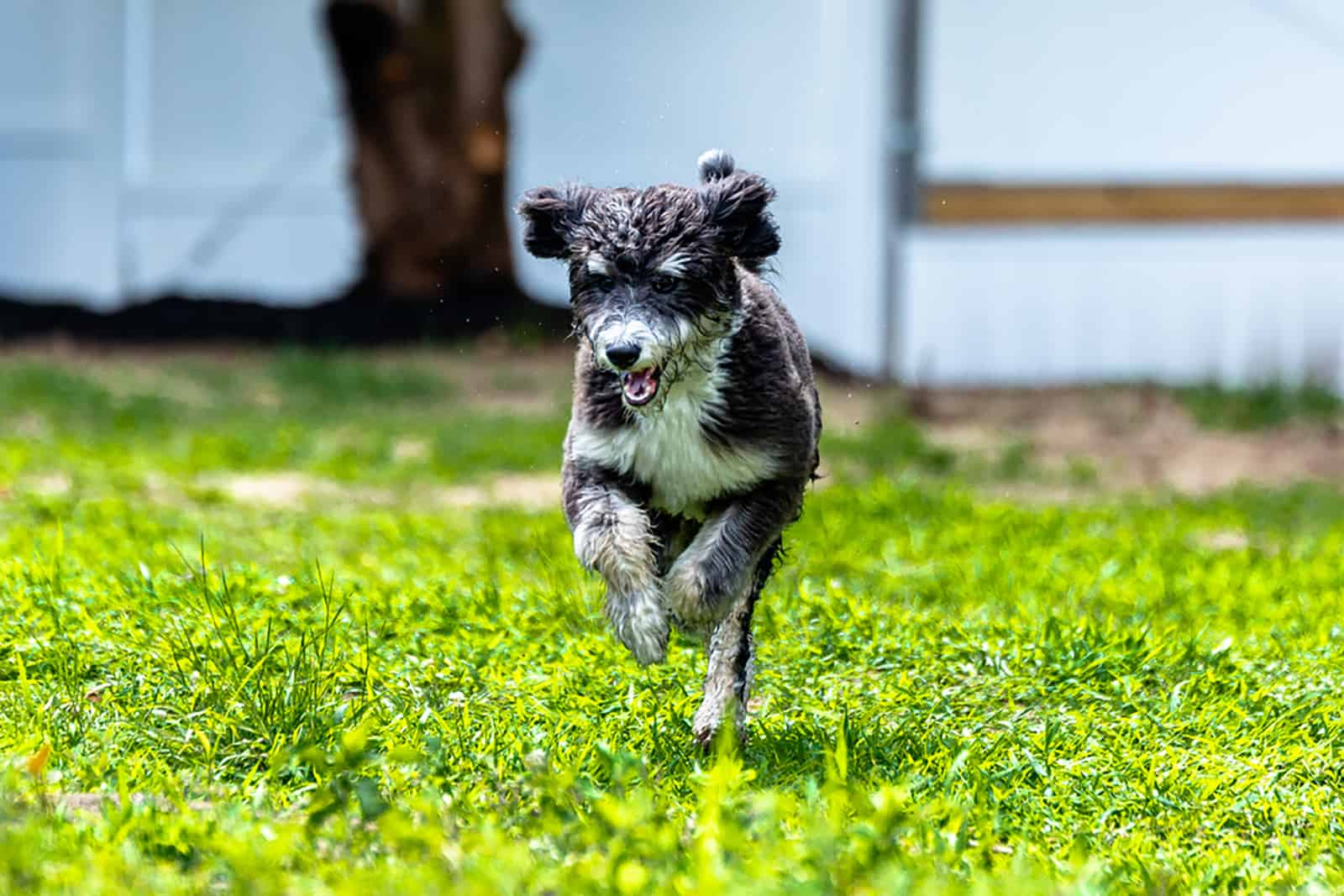
While a wholly subjective opinion that doesn’t give it many points, the sheer variety of options that Bernedoodles get thanks to their parent breeds is more diverse than that of the Sheepadoodle’s options.
Not by much, but enough to be noticeable.
However, some of you may like the aesthetics of one and others may like the other better. This one is purely statistical and can swing either way depending on your personal preference.
Daily Exercise Needs: The Bernedoodle Wins
While subjective depending on your own activity level, the fact of the matter is that Bernedoodles only need about an hour’s worth of walkies every day.
The Sheepadoodle on the other hand needs a little bit more to get all his energy out, around an hour and a half.
Depending on your own schedule and your own exercise regimen, one wins over the other, but for the average Joe, less is better.
Trainability: A Tie
While we did compare the intelligence of the two breeds, they both still have different kinks to iron out which are done through dog training.
Thankfully, both breeds are very easy to train and will catch on quickly to whatever it is you’re trying to teach them or have them forget, be it how to not be as easily startled for Bernedoodles or powering through that herding instinct for Sheepadoodles.
The Cost: The Sheepadoodle Wins
When it comes to the initial purchase costs, the Sheepadoodle comes in at around half of the price of a Bernedoodle.
This can be a good initial benefit, though, depending on outside factors, the Sheepadoodle’s care costs may outweigh that of the
Bernedoodle seeing as the latter ends up being a lot healthier than the former.
Plus, Bernedoodles need less money put into grooming than the Sheepdoodle here.
All of these are edge cases though and what really matters is that initial purchase price. The rest is variable.
Of course, you can get either of them at a fraction of the cost at local rescues or shelters too, though that’s mostly reliant on luck.
The Downsides: The Sheepadoodle Wins
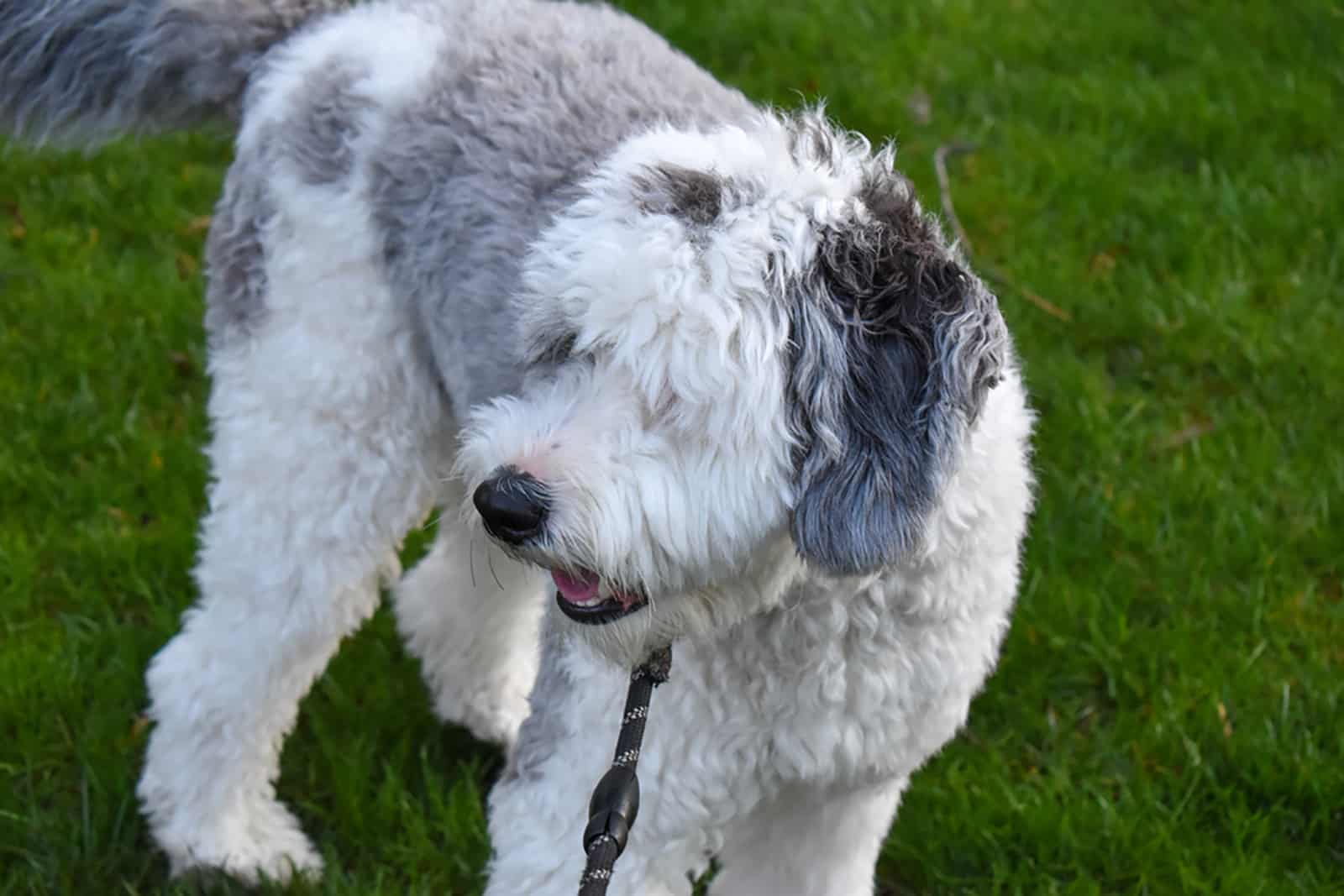
The final category are the downsides that both parties bring to the table.
They may be sweethearts, but they can be problematic if things get out of hand.
Mind you these are nothing overly debilitating and are just tidbits that can be improved upon through training and proper socialization, but they’re worth noting so you know what you’re getting into.
The Sheepadoodle has it a little easier here considering that he only really has to curb his natural herding instinct so he isn’t a potential threat to your kids with the occasional bite or nibble.
This one is easily improved on through a little bit of discipline and can vanish altogether in a matter of weeks, if not days.
Most Bernedoodles on the other hand, tend to be frightened a bit too easily, bless their soul.
This can pose a number of issues be it barking at night, worse overall health for the dog due to stress or anxiety build-up and many other problems tied to being so jumpy.
This too can be remedied through proper training and socialization, but is far harder to root out than that herding instinct mentioned before.
This is especially true if they’re an adopted dog that came from an abusive household, but that’s an edge case, at best.
Both of these dog breeds are also very clingy, in a sense. They crave attention and companionship, and if they don’t get either of the two, they can get lonely and depressed.
This then leads to various issues like separation anxiety and to the dogs trying to catch your attention so you’d spend more time with them, oftentimes through inappropriate means.
They can develop more destructive behavior like tearing through your exposed belongings, be it a coat, shoes, a mattress or similar.
Bernedoodle Vs Sheepadoodle: The Winner
So, with all of this data collected, there has to be a winner, right?
If we’re going by objectivity alone, I’d say that the Sheepadoodle would be the winner of this little contest.
Not only do they cost less, but I feel like they’re the more family oriented dog out of the two.
They aren’t as easy to startle as Bernedoodles are, they are more in tune to the emotional state of the individual and their downsides are easy to iron out with some disciplinary training.
Sure, they need a bit more exercise to satisfy their daily needs for activity, but that can also promote a healthier lifestyle for yourself.
The other points where the Bernedoodle had won in like coat color variety, grooming needs and mental intelligence are all won by a very small margin.
Truth be told, so were the ones where the Sheepadoodle won too, but, based on my own judgment, I’d say that it’s the better family dog of the two.
That said, this is purely my opinion that is likely to be biased despite trying to remain objective, and, ultimately, it’s going to come down to what you believe is best.
Some of these characteristics may hold more weight to you than they do to me so your own opinion may be different, and that’s completely fine.
I’m only here to present the facts in an easy to digest fashion to allow you to come to a decision that works best for you and hopefully make that decision a lot easier to come by.
FAQs
Why Do Both The Bernedoodle And The Sheepadoodle Need To Brush So Often?
Well, despite being mostly hypoallergenic, any dog with fur is bound to become the victim of matting, tangles and knots.
These can be a real pain and will generally ruin the dog’s aesthetic.
Brushing as often as is recommended helps straighten the hair out and untangle it, and the occasional bath on every grooming session helps keep it that way.
Are There Any Other Poodle Mixes Out There?
Of course there are, the poodle has been crossbred with a great number of other dog breeds and there are over 40 of them in existence.
The two that are the topic of today’s article aren’t even in the top 10, though they are great in their own right.
The top 3 mixes belong to the mixes with Cocker Spaniels, Schnauzers and Golden Retrievers, respectively.
In Conclusion
While this little Bernedoodle vs Sheepadoodle competition has shown us just how similar these two dog breeds are, there certainly are a few differences that set them aside as their own breed.
While the differences themselves are slim, Bernedoodles have shown to be more capable in accomplishing more complicated tasks, while the Sheepadoodle is more empathetic in his ways.
The other points are relatively minor apart from the price where the latter had won out by being almost half the price of the former.
Regardless of their differences, one thing is for sure, both breeds are beloved by dog owners everywhere and you won’t regret getting either of them.
They’re both fiercely loyal and make for great family pets and companions.
I’m sure that you’ll pick the one that’s right for you in the end. Until next time.
RELATED LINKS:
• Best Bernedoodle Breeders In Ontario: 10 Awesome Breeders!
• Top 8 Best Sheepadoodle Breeders – Puppy Price And Breeding Information
• The Sheepadoodle: Another Breed Of Doodle That You’ll Love!
• F1b Sheepadoodle: The Right Dog For You? Find The Facts Here!


